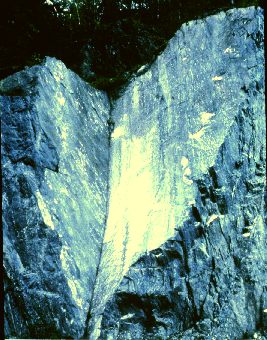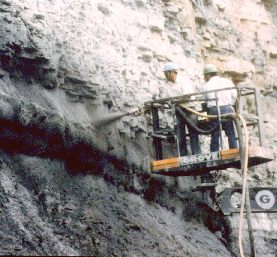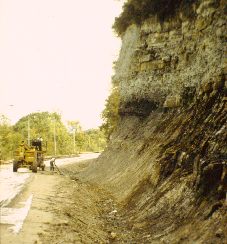|
| |
Rock Cut Slope Stability:
 |
Not all rock slopes are conducive to calculations. Some like this
one, where the failure mechanism is sliding, can be analyzed using limiting equilibrium
analysis. |
 |
Other slopes, whose failure mechanism is raveling, in not conducive to
calculation, and design and remediation must be empirically based. |
 |
Slopes like this must be remediated or stabilized by removing loose or
supporting loose rock. Scaling is usually more cost effective, and can be done
manually by mechanized means. Often the quantities of loose rock are not
evident until after scaling begins. |
 |
In some cases the rock must be supported. |
 |
In many cases it is more cost effective to mitigate damages from slope
failures rather that to try and prevent them. Mitigation measures include,
draped mesh and catch fences to stop or slow down falling rock and sculpting slope and
building ditches large enough to contain the failed material. |
|
|
| Viewed from the bigger picture, with a large network of roadways and
diminishing budgets, a large number of rock cuts must be analyzed and and remediation
efforts need to be prioritized on a RISK basis. In assessing RISK, both
we have to consider both the probability of failure and the consequence
of failure. Here again empirical formulation and classification can be used
to identify cuts with both high probability of failure and serious consequence to life or
property. Add to this equation the cost of remediation for each
instance and the process of selecting the optimum number and locations of remediation
efforts is achieved. |
|
REFERENCES:
Maerz, H. H., 2000. Highway
rock cut stability assessment in rock masses not conducive to stability
calculations. Proceedings of the 51st Annual Highway
Geology Symposium, Aug. 29-Sept. 1, Seattle, Washington, pp. 249-259.
Franklin, J. A., and Maerz, N. H., 1996. Empirical design
and rock mass characterization. Proceedings of the FRAGBLAST 5 Workshop on Measurement
of Blast Fragmentation, Montreal, Quebec, Canada, 23-24 Aug., 1996, pp. 193-201.
|
|

